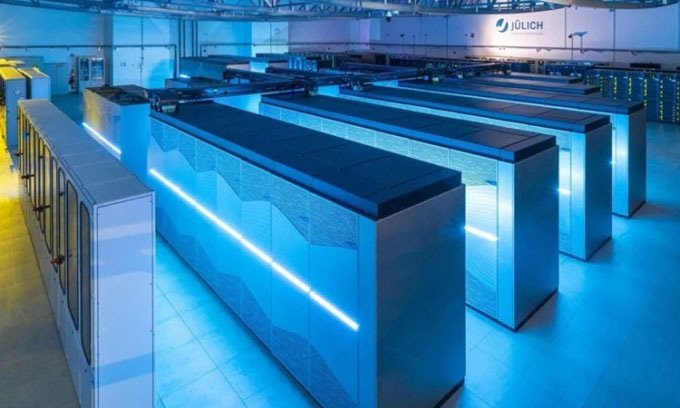Europe builds the world's fastest supercomputer
The JUPITER supercomputer located in Germany has the potential to become the world's fastest supercomputer for AI applications .
Europe is preparing to build the first exascale supercomputer called JUPITER , which could become the fastest and most powerful machine in the world, Interesting Engineering reported on December 29. JUPITER will pave the way for unprecedented scientific discoveries and innovations in fields from climate change to quantum physics, by performing calculations that very few computers in the US and China today can can do.

Jülich Supercomputing Center, where JUPITER is installed. (Photo: Jülich Supercomputer Center).
This supercomputer aims to achieve a breakthrough in Europe by conducting a trillion arithmetic operations every second. This exceptional level of computing power will provide new direction for scientific simulations and drive revolutionary achievements in the field of artificial intelligence.
Exascale supercomputers can perform one trillion calculations per second, equivalent to the computing power of 10,000 laptops combined. Currently, there are only two officially recognized exascale supercomputers in the world: Frontier at Oak Ridge National Laboratory in Tennessee and Aurora at Argonne National Laboratory in Illinois. However, China may own at least two untested exascale machines that are ranked in the list of the 500 most powerful supercomputers in the world.
JUPITER (Joint Undertaking Pioneer for Innovative and Transformative Exascale Research) will be built at the Jülich Supercomputing Center in Germany by the European High Performance Computing Joint Venture (EuroHPC JU), a collaborative project between the European Union and private companies. In a recent interview, professor Thomas Lippert, director of the Jülich Supercomputing Center, said JUPITER has the potential to become the world's fastest supercomputer for AI applications, with more than 90 exaflops at 8 bits. Exaflop is a unit of measurement for the total computing power of computer systems. Each exaflop is equivalent to one trillion calculations per second.
JUPITER will have a unique modular design consisting of two main parts: Booster module and Cluster module . The Booster module will use NVIDIA's advanced technology (nearly 24,000 NVIDIA GH200 GPUs) to provide computational power for artificial intelligence and simulation applications, such as training AI models that can create realistic images and text.
The Cluster module will use SiPearl's new Rhea processor, manufactured in Europe, to solve complex tasks requiring high memory bandwidth. The two modules will be incorporated by Eviden into their energy-efficient and liquid-cooled BullSequana JUPITER is the result of collaboration between ParTec, Eviden, SiPearl, and NVIDIA with the European scientific community. This will be the first exascale supercomputer in Europe .
JUPITER installation will begin in early 2024. Users can test and prepare the system under the JUPITER Early Access program, allowing close collaboration between stakeholders for fabrication and optimization. Develop the best possible version of the system for the scientific community.
Philippe Notton, CEO of SiPearl, said the machine has the potential to top the list of 500 supercomputers if there is no faster competitor. According to Notton, JUPITER's final ranking will depend on the performance of the institutes operating the machine and the hardware evaluation scores. However, he also emphasized that cutting energy consumption is important, because the cost of running JUPITER for 3 years is about 553 million USD, including an estimated 110 million USD in annual electricity costs.
- Japan built the world's fastest supercomputer
- Tianhe-2 is still the fastest supercomputer in the world
- China makes the world's fastest supercomputer
- Chinese supercomputer
- Chinese supercomputers continue to keep the world record
- The fastest supercomputer in the world is coming
- China created the world's largest virtual universe with supercomputers
- Nvidia creates 3D universe map using the world's most powerful AI supercomputer
- The fastest supercomputer in the world
- The fastest supercomputer in the world
- The US suddenly 'fired' IBM supercomputers
- Russia is building a 10 petaflop supercomputer
 What is the Snapdragon SiP chip?
What is the Snapdragon SiP chip? How to create a yellow circle around the mouse cursor on Windows
How to create a yellow circle around the mouse cursor on Windows Edit the Boot.ini file in Windows XP
Edit the Boot.ini file in Windows XP 3 ways to restart the remote computer via the Internet
3 ways to restart the remote computer via the Internet